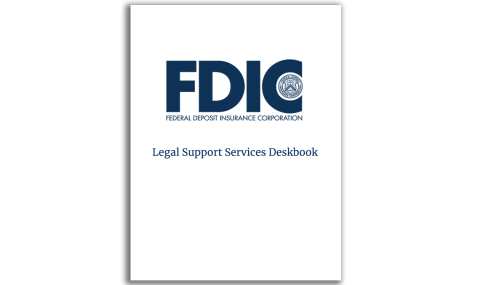
Legal Support Services Deskbook
The Legal Support Services Deskbook is also available in PDF format:
Legal Support Services Deskbook
PDF Help - Information on downloading and using the PDF reader.
Microsoft® Word Help - Information on downloading and using Microsoft® Word.
Purpose
The Legal Support Services Deskbook ("LSS Deskbook") has been prepared by the FDIC Legal Division ("Legal Division" or "Division") to provide policies and procedures, shell contracts, and standard forms for in-house attorneys, experts, and legal support services ("LSS") providers. It sets forth many of the FDICs requirements that govern the relationship between the FDIC and experts or LSS providers. It is important that in-house attorneys, experts, and LSS providers read, maintain familiarity with, and adhere to the provisions in the LSS Deskbook.
The LSS Deskbook includes policies and procedures and forms that the FDIC requires its experts and LSS providers to follow and use. Each chapter covers a key area or interest. Appendices provide additional information, forms, and worksheets. In-house attorneys will ensure that experts and LSS providers are provided copies of the LSS Deskbook.
Forms & Related Links
When signing an agreement with the FDIC, a legal support services vendor may be required to fill out the below forms. These forms are provided in PDF for reference only. If a vendor is interested in signing an agreement with the FDIC, please email lsscg@fdic.gov to initiate the application process.
Note
Fillable Adobe PDF Forms must be downloaded. To download, right click on the PDF form link and save a local copy.
Alternative Dispute Resolution/Binding Arbitration
- Binding Arbitration - FDIC Directive 5310.1 (June 5, 2001)
- Final Statement of Policy Regarding Binding Arbitration (govinfo.gov)
Budget Forms
- Expert Budget (FDIC Form 5210/08)
- Legal Support Services (LSS) Provider Budget Form (FDIC Form 5210/15)
Byrd Amendment
Conflicts of Interest
- 12 C.F.R. Part 366 - Minimum Standards of Integrity and Fitness for an FDIC Contractor
- Oral Representations and Certifications for Expert Legal Support Services Telephone Authorization for Expenditures Under $5,000 (FDIC Form 5210/14)
- Representations and Certifications for Expert Legal Support Services Provider (FDIC Form 5210/09)
Electronic Funds Transfer (EFT) Guidelines
- EFT Requirements
- Substitute Form W-9 Request for Taxpayer ID Number and Certification (FDIC Form 4351/10)
- Payee Information for Automatic Deposit of Payment form (FDIC Form 4351/09
Expert/Legal Support Services Agreement Forms
- Agreement for Services (Expert/Legal Support Services (LSS) Provider) Amendment (FDIC Form 5210/03)
- Agreement for Services (Expert/Legal Support Services (LSS) Provider) Rate Schedule (FDIC Form 5210/04)
Invoice Forms
- Expert Invoice for Fees & Expenses (FDIC Form 5210/01)
- Legal Support Services Provider Invoice for Fees and Expenses (FDIC Form 5210/02)
Travel
- Travel Voucher (FDIC Form 5210/12)
- FDIC's Contractor Travel Reimbursement Guidelines ("Guidelines")
- GSA Per Diem Rates (gsa.gov)
Related Information
Effective Date
The effective date of the LSS Deskbook is December 2005. The Legal Division may amend the LSS Deskbook from time to time. Amendments shall be effective on the dates specified by the Legal Division.
Organization
The LSS Deskbook contains the following three (3) primary parts:
- Policies and Procedures - Establishes guidance that contains three primary parts that must be followed when performing services for the FDIC. Some of these policies and procedures were written for outside counsel but also apply to experts and LSS providers.
- Forms - Forms are provided in the appendices and are referenced within the text of the corresponding LSS Deskbook chapter. Blank forms are provided as well as some completed forms that are provided as samples. The forms can also be printed from the FDIC Internet site: https://www.fdic.gov/resources/forms/index.html.
- Shell Contracts - Shell contracts provide minimum standard terms that must be used for experts and LSS providers when contracts are greater than $5,000. The shell contracts are optional for contracts less than $5,000.
Inquiries
For further assistance with FDIC's LSS Deskbook policies and procedures, contact the FDIC Oversight Attorney administering the agreement.
